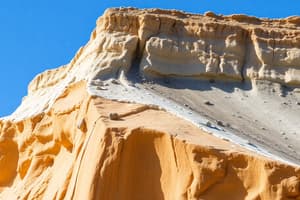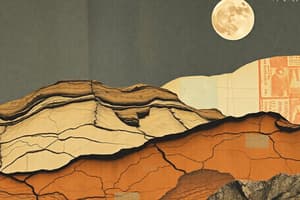Podcast
Questions and Answers
What is one effect of temperature changes on rocks in physical weathering?
What is one effect of temperature changes on rocks in physical weathering?
- Rocks dissolve due to chemical reactions.
- Rocks increase in strength from external pressure.
- Rocks become smoother through abrasion.
- Rocks can expand and contract, leading to crumbling. (correct)
Which process leads to the peeling away of outer layers of rocks?
Which process leads to the peeling away of outer layers of rocks?
- Abrasion
- Oxidation
- Exfoliation (correct)
- Ice wedging
How does oxidation contribute to chemical weathering?
How does oxidation contribute to chemical weathering?
- By mixing iron in rocks with nitrogen.
- By breaking rocks into smaller fragments.
- By combining minerals with hydrochloric acid.
- By allowing oxygen to chemically alter rock color. (correct)
What role does carbonic acid play in weathering?
What role does carbonic acid play in weathering?
Which of the following is NOT a contributor to abrasion?
Which of the following is NOT a contributor to abrasion?
Flashcards
Physical weathering
Physical weathering
The breakdown of rocks by physical changes, like freezing and thawing of water or temperature changes.
Chemical weathering
Chemical weathering
The breakdown of rocks through chemical reactions, like oxidation or acid reactions.
Ice wedging
Ice wedging
Water seeps into rock cracks, freezes, expands, and causes the rock to break apart. This cycle repeats, leading to weathering.
Oxidation
Oxidation
Signup and view all the flashcards
Carbonic weathering
Carbonic weathering
Signup and view all the flashcards
Study Notes
Weathering and Erosion
- Two types of weathering: Physical and chemical
- Physical weathering: Breakdown of rocks by physical changes
- Chemical weathering: Breakdown of rocks by chemical reactions
Physical Weathering
- Ice wedging (frost wedging): Water seeps into cracks, freezes, expands, and widens the cracks.
- Temperature changes: Expansion from heat and contraction from cold can weaken and break rocks.
- Pressure changes: Exfoliation - outer layers peel away due to pressure changes.
- Abrasion: Rocks break down by the mechanical action of other rocks, water, wind, and gravity.
- Biological activity: Plants growing in rocks can cause weathering.
Chemical Weathering
- Oxidation: Oxygen reacts with minerals, changing their color (e.g., rust).
- Acids: Groundwater acids (e.g., carbonic acid) dissolve minerals and rocks.
- Carbonic acid: Carbon dioxide in the air dissolves in rainwater, forming a weak acid.
Studying That Suits You
Use AI to generate personalized quizzes and flashcards to suit your learning preferences.




